- Home
- Sherry Thomas
The Hollow of Fear Page 15
The Hollow of Fear Read online
Page 15
“Did you remember something, Miss Holmes?” asked Fowler.
“No, but there is something that bothers me. I found Lady Avery searching my room yesterday. She later told me that she and her sister, Lady Somersby, were looking to see whether Lady Ingram might have left messages behind as to her whereabouts.”
“Yesterday, after Lady Ingram was discovered dead?”
“No, well before. Even her confession came while the icehouse was still in the distance.”
Fowler appeared to ponder this new information. “Where did ladies Avery and Somersby think Lady Ingram might have gone?”
“They weren’t sure, but they weren’t above suspecting Lord Ingram of keeping her under lock and key, possibly somewhere on this very estate.”
“Given that she was found dead on this very estate, perhaps that was not such an outlandish charge after all.”
“You are wrong, sir. Lady Ingram’s body in the icehouse makes their assertions more outlandish, not less.”
Miss Holmes stood straighter now, her voice stronger, a fiercer woman than Treadles had first given her credit for. “People thought it was a little odd—perhaps very odd—that Lady Ingram had left for Switzerland without any notice. But they didn’t worry about her. No one worried about Lady Ingram, ever. Not even in the immediate aftermath of the rupture between her and her husband, when everyone learned that she had screamed that she’d only married him for his money. They didn’t worry about her because they knew him. They knew that his character was above reproach.”
“We do not always know people as we think we do,” said Treadles.
“We do not. But in Lord Ingram’s case, Lady Ingram lost absolutely nothing for confessing that she was a cold-hearted fortune hunter. She didn’t lose her pin money. She didn’t lose her accounts at London’s leading dressmakers. She didn’t even lose the yearly birthday ball in her honor. He continued to extend to her every courtesy and privilege that came of being his wife—and that was the only reason she was able to keep her place in Society. Because he didn’t withdraw his support.”
“Perhaps he was planning, even as he maintained a façade of gentility, the ultimate revenge,” suggested Fowler.
“And then he chose to make his wife disappear on the night of a crowded ball, in a way that could only ever lead to unsatisfactory answers? You think Lord Ingram couldn’t have done better than that if he had indeed been scheming?”
Fowler had no good answer for that.
“Regardless, this is not the first time I encountered Lady Avery and Lady Somersby since the end of the Season. I can tell you with complete confidence that when I last saw them before this gathering, they weren’t remotely concerned with Lady Ingram’s fate. Lady Somersby said it was her feeling that Lady Ingram had had quite enough of Society, something deeper than mere end-of-the-Season weariness. Her sister questioned whether it wasn’t something to do with a latent animosity many felt toward her.”
Fowler raised a brow. “Latent animosity?”
By now Scotland Yard had received the impression that Lady Ingram had not been beloved, but there was a stark difference between the absence of universal acclaim and the presence of widespread ill will, however subterranean.
“There are very few heiresses among the women jockeying for eligible gentlemen on the marriage mart. And the cost of failure is high: lifelong dependence on disappointed parents and indifferent brothers, perhaps even the necessity of becoming a lady’s companion or, worse, a governess. No one would have thought any less of Lady Ingram for marrying the richest man she could find, certainly not when he happened to be both striking in appearance and sterling of character. Her success was a fairy tale, something to aspire to.
“And if that fairy tale was to gradually lose its potency, well, such is life. What was not supposed to happen was her brutal honesty. The unspoken rule has always been that if a woman marries for money, she keeps that to herself and maintains an appearance of interest in her husband. Because that is what his money paid for. She is never supposed to not only confirm that she has never loved him but also denigrate him in the same breath for his said-to-be half-Jewish blood.”
“I didn’t know Society ladies cared that those of Jewish roots should not be taunted for that fact,” said Treadles.
“What? No, they didn’t care about that. They cared that Lady Ingram didn’t just tear the fairy tale in two but spat on it. They cared that this sent a shiver through all the men of Society. If a paragon such as Lord Ingram couldn’t find a wife who genuinely loved him, what chance did the other gentlemen have? That lesson made them more cautious. Which, in turn, meant that unmarried women found it more difficult to land good husbands—and to keep up the illusion once they had.”
Fowler blinked. “That is an extraordinarily cynical observation.”
Yet highly riveting.
“That was Charlotte’s analysis—she dissects things differently. I think people didn’t like Lady Ingram because they admired Lord Ingram and felt he’d been treated badly. And then there were others who simply disliked her demeanor. When she made her debut, she appeared more genial. But as time went by, she became more and more unapproachable—and women don’t like women who are too haughty.
“In any case, that was ladies Avery and Somersby’s position earlier this autumn, not that anything had been done to Lady Ingram but that she might have taken the initiative to put herself out of reach. But here at Stern Hollow they have been consumed with potential disasters that might have befallen her.
“Ask them what brought on this concern, so strongly that they were willing to risk being caught poking into other guests’ rooms. I don’t know enough to make concrete guesses, but my sense is that something is rotten in the state of Denmark.”
With that, Miss Holmes nodded again and left.
“Well,” said Fowler, “I always enjoy a case more once witnesses start quoting Shakespeare, don’t you?”
* * *
Livia was still shaking as she climbed up the grand staircase. The house felt deserted, even though Mrs. Newell’s guests were still on hand. But the shooting, the games of charades, the play that would have been put on—dear God, to think that she’d rather hoped she might be considered for the part of Desdemona—everything that had been planned lay by the wayside, like so many dandelions trampled by a party of riders.
Instead, the gentlemen played endless games of billiards, making quiet remarks between echoing clicks of cue stick on ivory. The ladies slipped in and out of one another’s rooms; fear, suspicion, and speculation swept along torrents of whispers. And the servants, already unobtrusive in a well-run household, seemed to have disappeared altogether.
In the beginning, there had been knocks at Livia’s door, too. But she’d steadfastly refused to answer, not wanting to see the gossip ladies or anyone else who might either wish to commiserate or glean clues from what she could tell them—certainly not in the wake of all the speculation about Lord Ingram and Charlotte! Now no one came to call and she felt both relieved and spectacularly left out.
At the top of the grand staircase she met Lord Ingram, dressed as if he were about to go for a ride.
“Miss Holmes,” he said gently, “you already spoke to Scotland Yard, I take it? I hope it wasn’t too taxing.”
“Oh, I dare say I’ll—”
She bit back the last word. She’d live. But would he? Or was he already headed for a rendezvous with the hangman?
“I’ll forget about it by dinnertime, I’m sure. Are you all right? Has Charlotte been able to find out anything?”
Although what Charlotte could do from her cottage, even Livia couldn’t say.
“I’m well. And I’m sure Miss Charlotte will be instrumental in putting everything to rights again. Now, is there anything I can do for you?”
“No, you have so much—”
“You are mistaken
there, Miss Holmes. Other than letting the police deploy as they will, there is absolutely nothing I can do about anything related to Lady Ingram’s death. But if there is some service I may render you, it will take my mind off the situation. And that would be a welcome respite, however brief.”
“Oh,” she said. “If—if that is the case, then there is something that’s worried me recently.”
When she had time to worry about anything besides him.
“Please. Allow me to be of service.”
“Well, I don’t know whether Charlotte has ever mentioned her, but we have an elder sister who has never moved in Society.”
Bernadine was thirty years of age and it had been a quarter century since she last stepped out of the house. As far as Livia could remember, her name had never crossed anyone’s lips in a polite conversation. When Livia arrived in London, she was presented as simply Miss Holmes and not Miss Olivia Holmes, indicating that she was the eldest unmarried Holmes daughter, and completely erasing Bernadine’s position. Even Mrs. Newell, who otherwise remembered everyone, always referred to the Holmes girls as a trio and not a quartet as they were in truth.
She could only hope what she was about to reveal wouldn’t come as too much of a surprise to Lord Ingram.
“Miss Bernadine?” he said. “Yes, I know of her.”
Thank goodness. Livia gave a brief account of Bernadine’s change of surroundings, from the Holmes household to Moreton Close, the private institution for women from notable families who suffered from conditions similar to Bernadine’s. “I don’t trust my parents on important matters. I’m not sure I trust my own judgment on this, either. Charlotte has promised to investigate Moreton Close, but she can’t be spared right now.”
“I will direct my solicitor to make some inquiries, under the guise of representing the prominent family of a young woman who might benefit from their services. That way, we can perhaps gain entrance to the place.”
“Will you? That would be wonderful!”
Lord Ingram smiled, as if her relief had gladdened him. “Consider it done. But please know that it might take some time.”
“Thank you, my lord. Thank you!”
“No, thank you, Miss Holmes. And that reminds me, I have been tasked to give you a message.” He glanced behind himself. There was no one around, but still he lowered his voice. “Please visit the nursery. A mutual friend wishes to speak to you. Good day, Miss Holmes.”
* * *
The nursery was cheerfully decorated but silent and empty. Livia paced for a good ten minutes before a knock came. She rushed to answer—Charlotte, it had to be Charlotte.
But when she’d opened the door, a round, peculiar-looking man stood outside, all boutonniere and coiffed mustache, an ornate monocle screwed into one eye socket.
Disappointment and suspicion snuffed out Livia’s eager anticipation. “May I help you?”
“You may indeed, Miss Holmes,” said the man gravely. “I came to inquire after your progress on the Sherlock Holmes story.”
Only three people in the entire world knew that she was working on a story inspired by the Sackville case: Charlotte, Mrs. Watson, and the nameless young man who had recently sent her the moonstone cabochon.
Could this be him, in disguise?
Taking advantage of her astonished inaction, the man came in and closed the door. “I see Mrs. Watson and I are not the only ones you told, Livia.”
This time, he spoke with her baby sister’s voice.
Livia’s jaw fell. “Charlotte!” she managed in a vehement whisper. “Charlotte! What—what— Good gracious— I—”
She gave up and stared.
The man—Charlotte—smiled. “You would cut a more dashing figure dressing as a man, Livia. The only way to accommodate my bosom is to create a considerable paunch.”
“Your mustache . . . and beard . . .”
“I know. All very good. Mrs. Watson knew where to get the best.”
Livia pulled herself together. “So how long have you been here?”
“Since last night. I’m staying on this floor, where there are no other guests.”
“Have you found out anything? Do you know who killed Lady Ingram?”
“Alas, even Sherlock Holmes cannot solve everything at a glance.”
“But you will find out who did this, won’t you? You won’t let . . . you won’t let anything happen to Lord Ingram.”
Even with all the disguise, Charlotte’s expression was somber. “I will do what I can.”
Don’t forget, I’ll look after you, Charlotte had told Livia at one point this past summer, not long after she’d established herself as oracle to Sherlock Holmes, fictional sage. The certainty with which she’d said it, the inevitability—it had been a promise, pure and simple.
Here Charlotte made no promises. And beneath the dignity of her words, did Livia detect a trace of apprehension?
To Charlotte, fear was but a word in the dictionary—or at least it had always seemed so to Livia. While Livia dreaded and fretted over a thousand ghastly possibilities, Charlotte dealt with only facts and actual events. What did she know, then? What concrete, undeniable particulars could make Charlotte Holmes, she of the nerves of Damascus steel, actually afraid?
“Is it really that bad?”
Charlotte looked at her for a moment. “Lord Ingram is not without allies. Not to mention he has resources of his own.”
Again, an indirect answer. Livia’s heart fell like a dropped stone.
Charlotte moved to the middle of the nursery. “Anyway, how was your interview with the police?”
“I met that Inspector Treadles you worked with on the Sackville case. What an awful, sanctimonious man.”
Charlotte tilted her face in inquiry.
“The other inspector asked whether Lady Ingram might have been jealous of the friendship between you and Lord Ingram. I said that if she was jealous, it was over nothing, as you and Lord Ingram have always conducted yourselves according to the strictest rules of decorum. And guess what Inspector Treadles said?”
“Ah,” murmured Charlotte.
“He said, in almost those exact words, that weren’t you banished from Society because of something highly inappropriate with a different married man.” Livia all but growled. “I despise him. I wonder how Lord Ingram can be friends with someone like that.”
“No doubt Inspector Treadles wonders the same, how Lord Ingram can be friends with someone like me.”
“I have some police inspectors in my Sherlock Holmes story. I’ll change their portrayal, make them idiotic and incompetent, and call one of them Treadles.”
“That might not be the best idea.”
“Maybe not. But it’s a most satisfying thought.”
“I see you are all right,” said Charlotte wryly, “which is what I came to see.”
“I’ll be fine. I’m only a bystander in all this. I hope Lord Ingram . . .”
Against the stark reality of the situation, her hope seemed too fragile to take shape.
Charlotte briefly settled a hand on her shoulder. “I’ll do what I can. Now tell me, in some detail, what you discussed with Scotland Yard.”
When Livia had finished recounting what had been said, to the best of her recollection, including her charge that someone was deliberately trying to frame Lord Ingram, namely whoever had set Lady Avery and Lady Somersby to uncover a “grand injustice” for Lady Ingram, Charlotte nodded and fell silent.
After a minute or so, she said, “I must go now. The police will wish to speak to you again. And when they do, will you do something for me?”
* * *
“Uneasy about something, Inspector?”
Treadles started—and realized that he had been rubbing his temples while pacing the parlor, his strides quick and agitated. The more he thought about it, the more c
omplicated Charlotte Holmes’s presence became. Despite Lord Ingram’s denials, that he might wish to marry her was considered a potential, perhaps likely, motive for Lady Ingram’s murder. If Treadles were to tell Chief Inspector Fowler that Charlotte Holmes was here on the premises, in close contact with Lord Ingram, how would that affect Lord Ingram?
Disastrously, to say the least.
Fowler peered up at Treadles. He looked owlish, but an owl was a predator and a damned good one at that. Treadles felt trapped between his professional obligations and his loyalty to Lord Ingram. And the longer he waited before he revealed what he knew, the worse it would look for him.
“I was thinking about the state of Lord Ingram’s marriage in the past few years,” Treadles said. “Must not have been pleasant living in that household.”
“That’s the trouble with putting women on a pedestal. You do that, and they always fall off—knocking you over on the way down,” said Fowler.
Treadles might have laughed, if not for how aptly Fowler’s observation described his own situation.
The next moment his fingers were at his temples again, pressing hard. His reaction to the crumbling of Lord Ingram’s marriage had consisted primarily of a despondent sympathy. But now a terrifying thought struck. He had met Lady Ingram, not long before the latter allegedly fled with her lover. Granted the meeting had been very brief. But had he received any impression that Lady Ingram was the kind of woman to sacrifice everything for a man?
To the contrary, the more he thought about it, the more discordant Lord Ingram’s account grew.
At times he’d considered Charlotte Holmes cold, when Miss Holmes was only unsettlingly neutral. Lady Ingram, on the other hand, had been truly cold, a glacial lack of warmth that made Treadles wonder whether she derived any pleasure from life. He could see her act out of spite, but not love.
Not love.
He became aware that Fowler was still observing him. No point pretending that he wasn’t distracted, so he shook his head, as if to clear it. “A deuced business, this case.”

_preview.jpg) Claiming the Duchess (Fitzhugh Trilogy Book 0.5)
Claiming the Duchess (Fitzhugh Trilogy Book 0.5)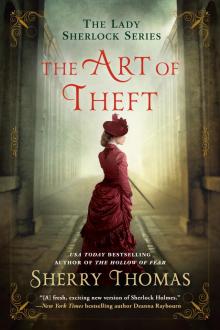 The Art of Theft
The Art of Theft The Magnolia Sword: A Ballad of Mulan
The Magnolia Sword: A Ballad of Mulan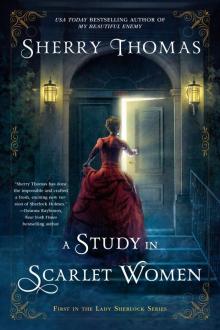 A Study In Scarlet Women
A Study In Scarlet Women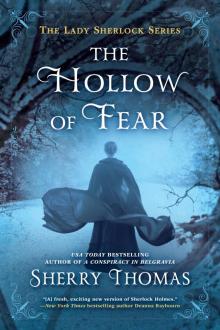 The Hollow of Fear
The Hollow of Fear The Magnolia Sword
The Magnolia Sword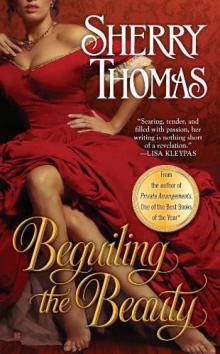 Beguiling the Beauty ft-1
Beguiling the Beauty ft-1 The Heart is a Universe
The Heart is a Universe The Hidden Blade: A Prequel to My Beautiful Enemy (Heart of Blade)
The Hidden Blade: A Prequel to My Beautiful Enemy (Heart of Blade)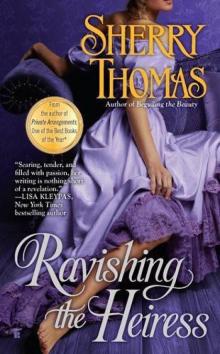 Ravishing the Heiress ft-2
Ravishing the Heiress ft-2 The Immortal Heights
The Immortal Heights The Hidden Blade
The Hidden Blade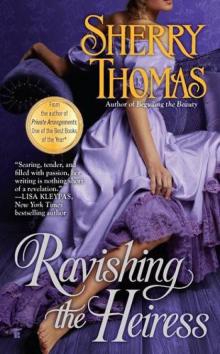 Ravishing the Heiress
Ravishing the Heiress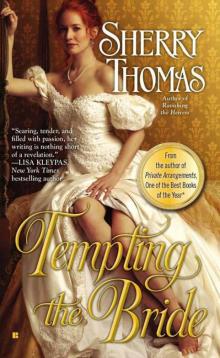 Tempting the Bride
Tempting the Bride The Luckiest Lady in London
The Luckiest Lady in London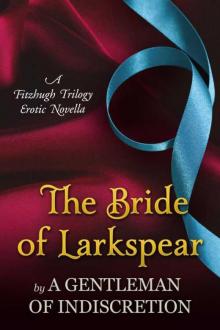 The Bride of Larkspear: A Fitzhugh Trilogy Erotic Novella
The Bride of Larkspear: A Fitzhugh Trilogy Erotic Novella Claiming the Duchess
Claiming the Duchess The One in My Heart
The One in My Heart His At Night
His At Night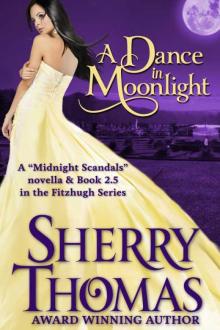 A Dance in Moonlight
A Dance in Moonlight A Conspiracy in Belgravia
A Conspiracy in Belgravia Not Quite a Husband
Not Quite a Husband